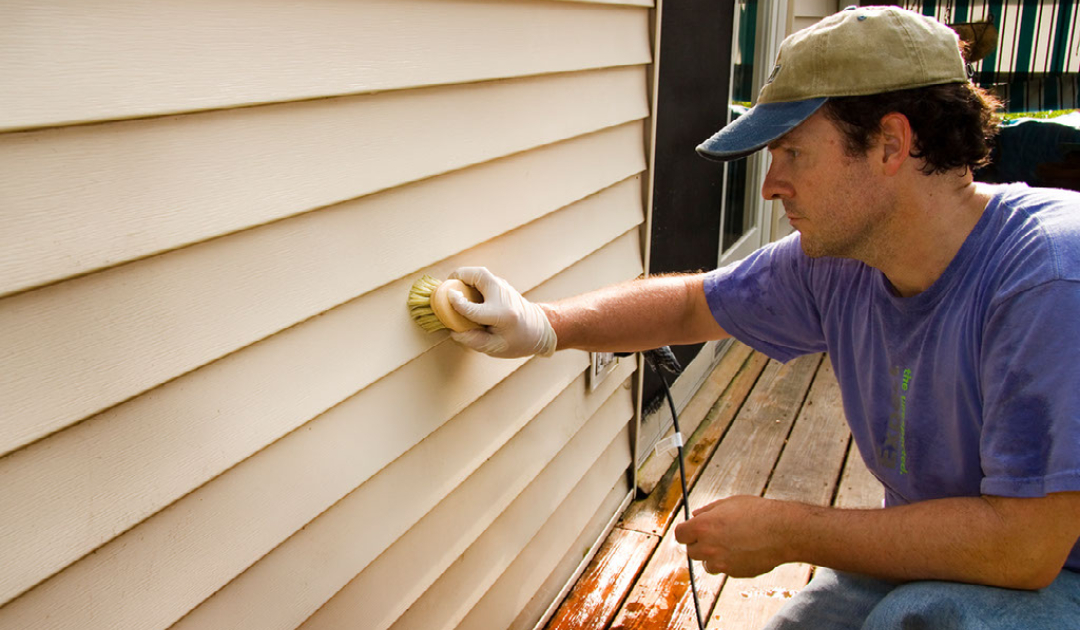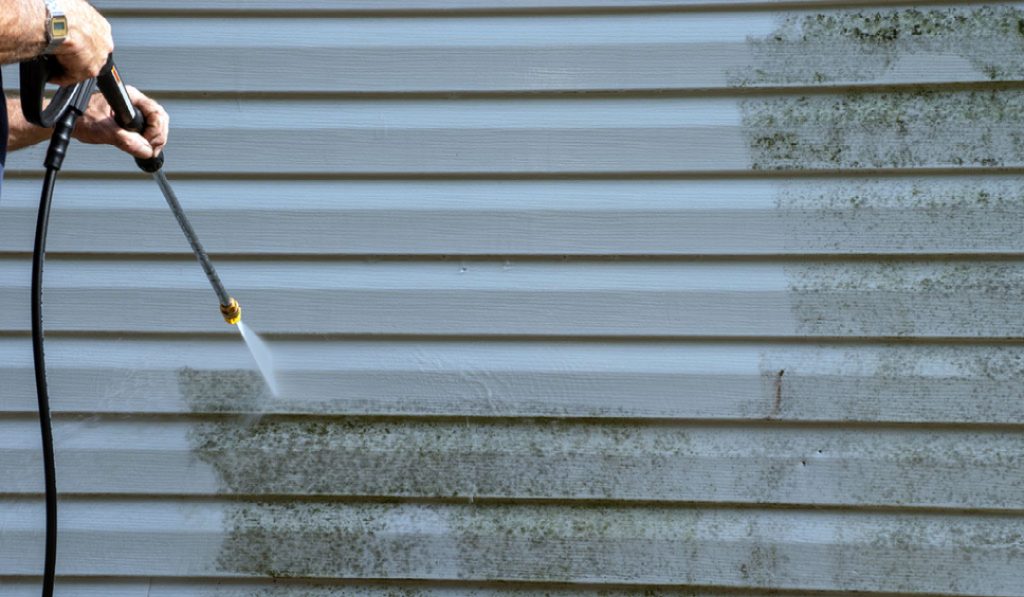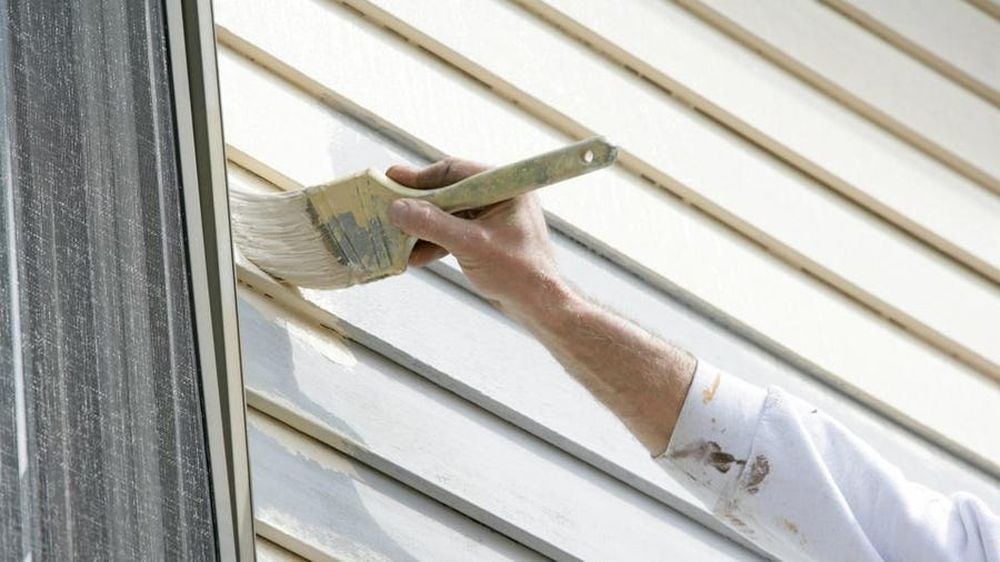Published on: April 26, 2022

Vinyl siding is one of the leading siding options because of its durability and low maintenance requirements. But that’s not to say that it is maintenance-free. From time to time, you might still want to clean the siding to restore it to its original color and beauty.
Removing mulch residue as well as mold and mildew will help your home look great and give you an incredible sense of satisfaction as you pull up to your home. Some mild soap and water, a power washer or even your garden hose will generally do the trick.
To keep your home looking great and ensure the greatest durability and home protection, here are several vinyl siding cleaning and care tips.
Spots of dirt, mold or mildew will impact the curb appeal of your home. And cleaning up those unsightly spots is incredibly simple and easy to do. Here are some ways you can wash your vinyl siding.
If you need to clean up areas of your siding that are lower to the ground, you can get a bucket of water with some gentle soap and water. Use a soft cloth or soft bristle brush to wipe down your siding.
The soft-bristled brush will be the better option if your home has textured surfaces. That way, you can get into the groves to make your home look spotless just like the day your siding was installed.
While cleaning, start at the bottom and work upward. Be sure that you’re pausing regularly to rinse off the soap. You don’t want it to dry on the house.
If your home has brick in addition to vinyl siding, cover your brick to protect it from runoff and soap spray. Soap chemicals could be harmful to the brick and cause discoloration.
Vinyl siding will hold up to a power washer. You should have no problems using this device to clean your siding as long as you’re using it as prescribed in the instructions.

Be sure that you are holding the power washer straight and at eye level. This will keep the stream of water on top of the siding, which will ensure the best cleaning results.
Aiming the water upward can cause water to spray at an awkward angle and lead to water behind your siding.
Before using a power washer on your home’s siding, review the care instructions from your siding manufacturer. This will tell you how to best care for and clean your siding without damaging it or the walls of your home.
While it’s not very common, some manufacturers do not recommend using a power washer on their products. Other manufacturers put limitations on how and when to use pressure washing to clean the siding.
Most manufacturers state that you should use extreme caution when cleaning around any opening in the wall. This includes windows, doors, plumbing and wiring.
So do your homework before pressure washing your siding.
With time, vinyl siding often gets spots of mold and mildew. It’s nothing you’re doing wrong or a defect in the siding. You can use common household cleaners, such as Windex, to remove these spots on your siding. Or you can create a homemade solution that is 3 parts vinegar to 7 parts water.
Another good cleaning solution for mold and mildew is powdered laundry detergent, household cleaner (e.g., Spic & Span), bleach and water. Here’s how to make the cleaning solution.
Because the solution has bleach in it, you’ll want to protect your skin with thick rubber gloves. Otherwise, you might end up with irritated skin after completing your cleaning session.
Scrub the affected area with your cleaning solution and you should have no problem removing the mold or mildew.
Artillery spores naturally occur and grow within shredded wood mulch. You should be very careful when spreading this type of mulch near your home because removing the spores from vinyl siding is not possible.
Once this fungus begins growing on your home’s siding, you’ll need to replace the siding to resolve the issue. If you choose to replace the pieces of affected siding, make sure you switch to bark mulch to prevent the issue from happening again.
Learn more about the spores that can grow in landscaping mulch by reading up on it from this helpful article.
Caring for your vinyl siding with preventative maintenance and cleaning will help you get the most out of your investment. When well cared for, vinyl siding can protect your home for up to 40 years. Here are some things you should be doing to preserve the siding.
Choose vinyl siding with quality stains or sealants to protect it from discoloration. Additionally, avoid getting insecticides or herbicides on your vinyl siding as these will be very harmful to it. Read labels carefully before getting any chemicals or solutions near your home’s siding.
As fall begins, many homeowners love the idea of a roaring fire outside. And while there are many tools to help you enjoy a safe fire, make sure that heat sources are far away from your home.
Outdoor heaters and fire pits should be distanced from your home to protect the integrity of your home and reduce issues with melting siding.
Siding is designed to hold up under tough natural outdoor conditions, including hot summer days. But it is not designed for holding up to campfire temperatures.
If you’re looking to transform your vinyl siding or hide discoloration, you might be able to paint your vinyl siding. But like other changes to the siding, you should review the manufacturer’s recommendations before painting.

Choosing to paint your siding could result in the manufacturer voiding your warranty. And if you don’t do it right, you might have peeling paint that impacts the look of your home within just a few years.
Make sure you work with a professional to paint your vinyl siding and know that your siding is rated for painting before embarking on this home maintenance tactic.
If you’re unsure about the best siding option for your home based on the required maintenance, learn more about what’s involved in caring for various types of siding. Here’s a look at what you should expect.
From this list, you’ll see that vinyl siding is the lowest maintenance option. But there are still many advantages and disadvantages of various siding types that you’ll want to weigh before installing a certain siding type. The pros at 2FL Windows, Siding and Roofing can help you decide what is best for your home and budget. We offer no-cost, no-obligation in-home quotes. Contact us now to schedule your estimate.
Further Reading:
Comments are closed.

Read the latest articles about siding.

[…] HOAs require siding with vinyl because of its great advantages and attractive curb […]
[…] was 60’s when vinyl siding started getting momentum among American homes amidst the ubiquity of aluminum siding. However, the […]